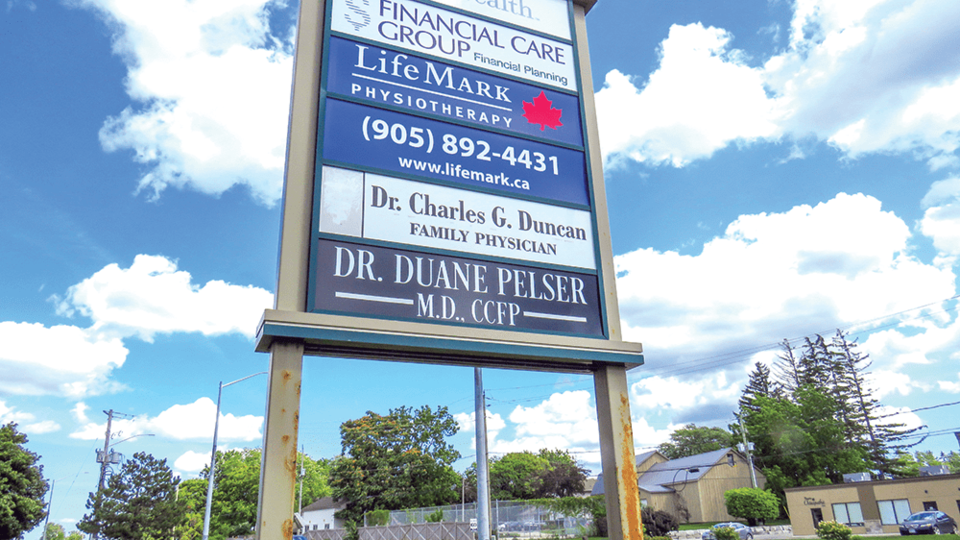In August 2017, Dr. Duane Pelser suddenly closed his practice, leaving a host of questions unanswered, until now
In the months leading up to the closure of his medical office in late summer 2017, two individuals approached the Voice with allegations of personal misconduct by Dr. Duane Pelser.
Coincidentally, earlier that year Pelser had moved his family practice into the same building in which Dr. Charles Duncan maintained his practice—into office space, in fact, occupied by the Voice until December 2016.
Citing concerns for their personal safety, neither individual who contacted the newspaper would agree to speak on the record, even if their names and potentially identifying personal details were withheld.
One provided police incident report numbers, reports which allegedly containing information related to Pelser’s conduct outside the office. The Niagara Regional Police Service denied the newspaper’s Freedom of Information request to obtain copies, noting that the request had to come with the consent of the complainant. The complainant was ultimately not willing to provide this consent to the Voice.
Both individuals asserted that Pelser was under investigation by the College of Physicians and Surgeons of Ontario (CPSO). Citing confidentiality regulations, the CPSO would not confirm at the time whether Pelser was being investigated.
In August 2017, the CPSO stated that Pelser’s medical license had been suspended due to his failure to pay his renewal dues in a timely manner.
In an interview with the Voice, Pelser said that the CPSO informed him that he would be required to apply for a new license, as if he were a new doctor. This left Pelser’s estimated 1,000 patients without a family doctor, which inspired a petition drive among some of them to get the CPSO to reverse course.
 Pelser returned to his native South Africa, vowing to appeal the decision. By the following spring, he had stopped replying to Voice follow-ups about his intentions.
Pelser returned to his native South Africa, vowing to appeal the decision. By the following spring, he had stopped replying to Voice follow-ups about his intentions.
It now emerges that the CPSO ruled, in four separate findings between 2018 and this year, that Pelser had violated multiple regulations. Specifically, each report—publicly accessible on the CPSO’s website—focused on his conduct, professionalism, and interaction with colleagues; his use of medication returned from patients, and failure to protect patient health information properly; and improper prescribing of medications.
In the first report, from July 2018, the CPSO ruled that Pelser failed to meet the standard of practice in nine of 21 patient charts reviewed. According to the report, clinical deficiencies identified by an appointed medical inspector included improper test result follow-up, inadequate documentation (including management of a patient’s mood disorder), inadequate prenatal care, inappropriate management of microscopic hematuria, not following prostate cancer screening guidelines, not investigating elevated ferritin, and suboptimal medical management of a patient’s glycemic control in Type 2 diabetes—and delayed referral to a specialist.
The medical inspector cited a lack of knowledge, skill and judgment in certain charts, and opined that Pelser’s clinical practice, behaviour or conduct was likely to expose patients to harm or injury in three of 21 patient charts reviewed.
The CPSO also documented a report from a woman who at one point had been in a personal relationship with Pelser —but had never been his patient —asserting that Pelser prescribed muscle relaxants to both the woman and her family member. The complainant also claimed that Pelser used drugs from his patients for personal use, and logged into another physician’s computer to print off his own prescription.
The woman also claimed that Pelser had been physically and mentally abusive to her in the course of their relationship.
In his only response listed in the CPSO reports, Pelser denied the abuse allegations but acknowledged he kept some discarded patient drugs, and that he utilized a colleague’s office computer—using that individual’s password—to write prescriptions for himself. Pelser denied prescribing medication to the woman with whom he had the relationship, although acknowledged doing so for the family member.
However, in the CPSO’s final committee summary report this past June, the College stated that investigators obtained information indicating that Pelser had written numerous prescriptions for himself, and that records of many of them had been deleted. Investigators also uncovered multiple prescriptions from Pelser for the individual with whom he had the relationship.
CPSO policy states that physicians must only provide treatment for themselves or family members, in limited circumstances, and that none applied in any of Pelser’s circumstances.
Pelser’s certificate of registration with the CPSO expired on August 10, 2017. Several of Pelser’s patients in Pelham had difficulty accessing their medical records after his departure.
The CPSO’s position is that given Pelser is no longer a College member, and is not presently practicing medicine in the Province of Ontario, they are “satisfied the public is protected.” In each report, the CPSO states that Pelser would have to attend a hearing of the College’s Discipline Committee if he were ever to reapply to practice medicine in Ontario.
Pelser did not reply to requests for comment sent through email and social media over the weekend.
Pelser's former office on Highway 20—which saw some $100,000 in renovations before he moved in— remained unoccupied and dark when the Voice visited the building late last week.
With additional reporting by Dave Burket



